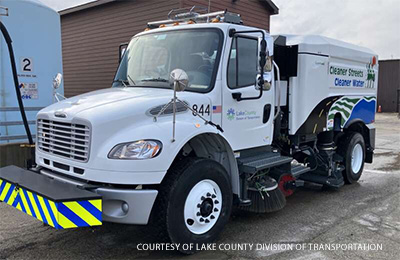Lake County, Illinois is Rebranding Sweeping Program to Community |

Officials in Lake County, Illinois, decided to rebrand/educate citizens about the value of street sweeping when it comes to maintaining water quality. The County's Department of Transportation has branded the side of its new sweeper "Cleaner Streets, Cleaner Water," due to the agency's recognition that "street sweeping helps keep pollutants out of waterways."

April, 2024 Street sweeping is a critical environmental management practice that plays a significant role in maintaining clean waterways and supporting urban infrastructure. The Lake County Division of Transportation (LCDOT) conducts street sweeping as part of its commitment to clean water initiatives and in compliance with the U.S. Environmental Protection Agency's Clean Water Act. This effort is not only about keeping the streets visually appealing but also about removing pollutants and debris from roadways, which, in turn, protects our water bodies from contamination. Each year, LCDOT carries out three rounds of street sweeping, collecting approximately 420 yards of debris per sweep. This debris is then transported to public works and LCDOT drying beds for disposal. The primary goal of this operation is to prevent leaves, garbage, and other pollutants from entering sewer inlets and stormwater systems. The importance of street sweeping extends beyond local initiatives. Across the globe, urban areas rely on street sweeping to mitigate the adverse effects of stormwater runoff. Pollutants carried by runoff can lead to eutrophication in water bodies, degrading water quality and harming aquatic life. By removing debris and pollutants from streets, municipalities can significantly reduce the amount of pollution entering stormwater systems. This not only helps in preserving the natural ecosystem but also supports public health by ensuring cleaner water sources. LCDOT's new sweeper, a 2024 Elgin Whirlwind 1, which debuted in early April, incorporates eco-infused technology. This innovative approach utilizes a single engine for both driving and operating the sweeper, making it more environmentally friendly than dual-engine models. This technology not only reduces waste but also minimizes emissions, aligning with broader environmental sustainability goals. The street sweeping program typically runs from the end of March, when temperatures rise above 35 degrees, until November. The operations focus on county roads equipped with curb and gutter, center and barrier medians, center turn and bike lanes, in front of guardrails, and on wider road shoulders as needed. The county highway system spans 900 lane miles. In addition to routine sweeping, the program is equipped to respond to emergency spills, such as glass, dirt, or gravel, and provides services for some townships and municipalities. For bike paths and other areas where the main sweeper is too heavy, a smaller piece of equipment is utilized. Through these efforts, LCDOT not only aims to maintain the cleanliness and safety of the county's roads but also to educate the public on the environmental significance of street sweeping. By understanding the connection between street cleanliness and water quality, communities can better appreciate the value of these seemingly mundane yet vitally important public works activities.  adapted by Ranger Kidwell-Ross with many thanks to info from an article by Mike Zawislak of Suburban Chicago's Daily Herald. adapted by Ranger Kidwell-Ross with many thanks to info from an article by Mike Zawislak of Suburban Chicago's Daily Herald.
|
© 2005 - 2024 World Sweeper
|
Street Contents
|